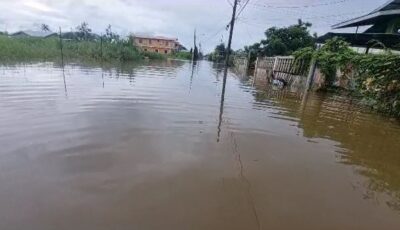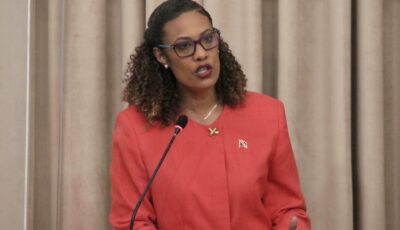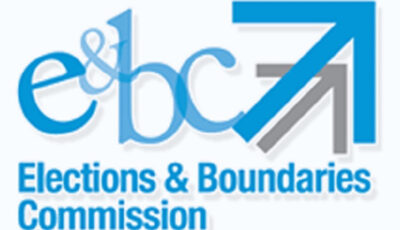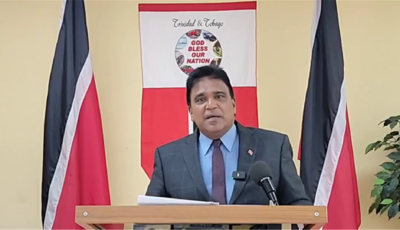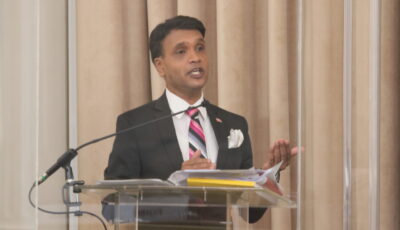PM’s statement to Parliament on Indian Arrival Day

Prime Minister Kamla Persad-Bissessar SC, third from left, with members of her Government dressed in traditional Indian wear, during today’s sitting of the House of Representatives. From left, MinisterS Nizam Baksh, Anil Roberts, Vernella Toppin-Alleyne, Stacy Roopnarine, and Carolyn Seepersad-Bachan, PHOTO COURTESY THE OFFICE OF THE PRIME MINISTER.
INTRODUCTION
Mr Speaker, it is my great pleasure to speak on this very important observance of the 169th Anniversary of the arrival of our East Indian ancestors to the shores of Trinidad and Tobago.
The fact that this annual observance of Indian Arrival Day has consistently grown larger with each passing year is testimony to the belief that there is much to celebrate, as well as to preserve and indeed to share and be grateful for.
For many, it is a day of reflection and understanding where the ancestors of thousands of our citizens came from.
For some, it is a day of appreciation and understanding, when we look deeply at the origins of a rich culture that has blended into the national landscape as something that is now total Trinidad & Tobago.
For others still, it is a day of thanksgiving, whether by reflection or appreciation, that those who came and made the first steps in a new land, built and left a legacy that each and every person of our country can be proud of.
THOSE WHO CAME
Mr Speaker, on Indian Arrival Day, it is expected that many will speak of the history of the arrival of East Indians in Trinidad & Tobago.
We reflect on the perilous journey which our ancestors made over the dark Atlantic waters, the Kala Paani, to arrive at a place of which they knew little, but with hopes in their hearts for a better life.
They became “jahajees” on the boats, forming strong bonds of friendship that would last and help to sustain them as they assumed their new roles, in their new lives.
Some accounts of history tell us that the journey was far from voluntary for some of those who came.
And yet for most, though with some hope of one day returning, there was a finality about this long voyage that was bringing them to a part of the world many may not have even known existed.
Leaving the shores of the only home they ever knew must have been a moment of agony, confusion and doubt, and some may even have wanted to change their minds.
As a people who were deeply community oriented, accustomed only to the faces, people and names that they knew, the journey would have been made even more intimidating, now being forced to either join hands with persons they never met, or stand alone and unsure of the future.
But Mr Speaker, more than the journey, the anxiety, and the fear of the unknown, what is best remembered is what they did in order to hold their lives together and walk a new path, on new ground, with determination.
They could not have known that their first steps on these shores would have eventually led to an enormous contribution to the civilization we know today as mother Trinidad & Tobago.
And so, it was the strength of their worship and teachings, the advice of their elders, the urgings of their parents and the customs they firmly held to, that provided them with the will to make a new world work for them.
This was how, out of mud, thatched roofs and only the bundle of their dearest possessions, they persevered and survived the many hardships, and over many decades were able to build strong communities with robust value systems and preserved traditions.
OUR INHERITANCE
Today, the inheritance that we all as citizens enjoy was created in part by their sacrifices and decades of labour, anguish and determination.
This story is in some ways similar to the Africans who came before, but Mr Speaker, theirs was a far greater torture, a far more dreadful experience of violence, indignity and slavery which by the strength of the human spirit, they reached a new dawn of liberty.
The reason I say this Mr Speaker is that when we commemorate the past with national observances such as Indian Arrival Day, it is not simply about trumpeting the value and benefit of the inheritance of part of our history.
No!
It is about recognising how all through history, those who came, whether from India, Africa, Europe, Asia, the Americas, brought with them certain values, beliefs, traditions and principles that have served to help build the society we are proud of today.
It is also about recognising that those who came, didn’t arrive to find unpopulated islands; they found the indigenous people, the ones who pre-dated Christopher Columbus, the ones who really are among the original builders of our country.
All of these people, Mr Speaker, through all of the centuries past, had to bear such tremendous trials and had to defy limits they never knew they possessed.
And as we do every year, by commemorating all the people who came, and showcasing the traditions we inherited and the society they taught us to build, this is why it is so important.
And this is why on 30th May every year, we shine a light on the descendants of East Indians, recognising their very strong contribution to building the Trinidad & Tobago that we, all of us, will give our lives to defend.
THE TRADITIONS
Today, there are some traditions which, by evolution, have been able to provide us with the basis of understanding unity, appreciating diversity, and our passion for our liberty.
In so many ways today, the traditions of the East Indians have transcended time. And while the community has worked hard to preserve the ancient traditions and cultures brought in 1845, we fervently uphold our strength as one nation, and one people, held together by our diversity.
I recall the stories of one of the traditions brought to Trinidad & Tobago – the Panchayaat. In this system five elders of the community were given responsibility for resolving conflicts, making judgments and even administering penance and punishment.
The Panchayaat system held families and communities together to ensure that a hard-won and jealously protected system of moral values and ethics was never compromised.
The Panchayaat system was supported by a strong moral force and was administered with a solemn purpose of giving the younger ones the moral compass to live good lives, and passing on their wisdom to others in their community.
In some communities today, while known by a host of different interventions, and driven by varied interest and community groups, this is the kind of approach that is actually reaching young people who may have strayed off the right path.
This is how, through programmes like the National Mentorship Programme, we are encouraging young people to turn away from deviance and anti-social behaviour and embrace their citizenship, their families, their friends and a future that holds a place especially for them.
Now, Mr Speaker, let me make clear that I am not suggesting that the National Mentorship Programme was built along the lines of the Panchayaat system.
And I make that clear because I know how many are prone and keen on taking anything that can be misrepresented to the nation.
What I am in fact saying is that many of the challenges we face today, as a modern society, can find solutions in the wisdom of our elders and ancestors, by traditions passed down through centuries.
We must always take heed of the wisdom that elders passed on to us, and use that wisdom to inform our daily lives, and truly secure the moral compass we will in turn pass on to future generations.
ANCESTRAL WISDOM, TODAY’S EXPERIENCE
And Mr Speaker, observances such as Indian Arrival Day really must drive that point home to us as well. It is not simply about revelling in our pride and traditions; it is about how we use today’s experiences to share our own wisdom with tomorrow’s people.
It is about paying homage to the past that brought us here, and taking responsibility for the future we must create.
And if we look around the world at how some nations have come apart, we can usually trace the first instability right back to a loss of values in homes, then villages, then cities, then an entire population.
We too have had our own experience here, Mr Speaker, when one small group, which allowed itself to be guided by a deviant purpose, brought our nation to a standstill for almost one week.
But what was it that drove us to take back our democracy and to stake our lives as Trinidadians and Tobagonians?
It was a passion for our country; it was about protecting the things we have made ours, the inheritance we were holding in trust for our children, and it was about standing together as one people and saying in one voice, we will not be broken!
So Mr Speaker, by shining a light on the past and paying homage to ancestral journeys that created the nation we know today, these are the things that we are really appreciating.
The source of our passion, the origins of the strength we stand with as a nation, the teachings that inspired us to not only fight for equality for ourselves, but to ensure that every single man, woman and child of our country are equal.
Mr Speaker, Honourable Members, citizens of our great nation I wish you all a Happy Indian Arrival Day 2014. I thank you.


